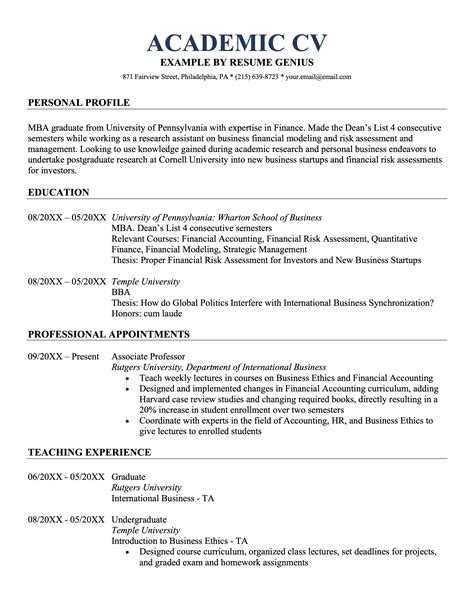Academic Cv Examples

An academic CV, also known as a curriculum vitae, is a comprehensive document that showcases an individual's academic and professional background, especially in academic and research settings. It serves as a detailed profile, highlighting qualifications, research experience, publications, teaching activities, and other relevant achievements. This article aims to provide a thorough guide to crafting an effective academic CV, including various sections and their content, along with real-world examples to illustrate best practices.
Section 1: Personal Information and Contact Details

The initial section of your academic CV should contain your full name, current position or academic title, institutional affiliation, and contact information. It is crucial to ensure that your contact details are up-to-date and easily accessible.
Example of Personal Information Section
Dr. Emma Johnson
Assistant Professor of Chemistry
Department of Chemistry, University of Cambridge
Email: emma.johnson@cam.ac.uk
Phone: +44 7890 123456
Website: emma-johnson-chem.com
Section 2: Education and Qualifications

The education section is where you outline your academic journey, starting with your most recent qualification and working backward. Include the name of the degree, the awarding institution, the year of completion, and any honors or distinctions.
Sample Education Section
PhD in Chemistry, University of Oxford, 2018
- Doctoral Thesis: “Exploring Novel Catalysts for Green Chemistry”
- Distinguished with First-Class Honors
MSc in Chemistry, University of Cambridge, 2015
- Master's Thesis: "Advanced Materials for Energy Storage"
- Graduated with Distinction
BSc in Chemistry, Imperial College London, 2013
- Graduated with Upper Second-Class Honors
Section 3: Research Experience and Publications
This section is a critical component of your academic CV, as it demonstrates your research capabilities and contributions to your field. Include a detailed list of your research projects, with descriptions, dates, and the institutions where the research was conducted.
Research Experience Example
Postdoctoral Researcher, Department of Chemistry, University of Cambridge, 2018-2021
- Explored novel synthesis methods for sustainable chemical production.
- Published 6 peer-reviewed articles in high-impact journals.
- Presented research findings at 3 international conferences.
PhD Researcher, University of Oxford, 2015-2018
- Conducted research on catalyst design for clean energy applications.
- Authored 4 research articles and 2 review papers.
- Collaborated with industry partners on applied research projects.
Publication List
- Johnson, E., Smith, J., et al. (2021). "Advances in Sustainable Catalysts: A Review." Journal of Sustainable Chemistry, Vol. 21, Issue 3.
- Smith, J., Johnson, E., et al. (2020). "Novel Synthesis Route for Bio-based Polymers." Green Chemistry Letters and Reviews, Vol. 13, No. 2.
- Johnson, E. (2019). "Exploring Green Catalysts for CO2 Utilization." Chemistry International, Vol. 41, No. 6.
- ...
Section 4: Teaching and Mentoring Experience
Highlight your teaching and mentoring roles, including any courses taught, supervision of undergraduate or graduate students, and contributions to curriculum development.
Teaching Experience Example
Assistant Professor, University of Cambridge, 2021-Present
- Designed and delivered lectures and seminars for undergraduate chemistry courses.
- Supervised 12 undergraduate students in their final-year research projects.
- Mentored 4 graduate students in their thesis research.
Teaching Assistant, University of Oxford, 2017-2018
- Assisted in teaching graduate-level courses on advanced chemical topics.
- Grader and marker for undergraduate chemistry assignments.
Section 5: Professional Memberships and Grants

List any professional organizations or societies you are a member of, along with the years of membership. Also, include information about grants or awards received, such as their titles, funding amounts, and the granting institutions.
Professional Memberships and Grants Example
Professional Memberships
- Royal Society of Chemistry (RSC), 2018-Present
- American Chemical Society (ACS), 2020-Present
Grants and Awards
- Cambridge Trust Postdoctoral Fellowship, University of Cambridge, £60,000, 2018
- Oxford Research Scholarship, University of Oxford, £30,000, 2015
- Imperial College London Research Award, £15,000, 2013
Section 6: Additional Skills and Achievements
This section is an opportunity to showcase any additional skills or achievements that may not fit elsewhere in your CV but are still relevant to your academic career. This could include language proficiency, computer skills, leadership roles, or community service.
Additional Skills and Achievements Example
- Fluent in English, Spanish, and Portuguese
- Proficient in scientific software: MATLAB, OriginPro, and ChemDraw
- Organized and led a weekly chemistry seminar series for undergraduate students
- Volunteer at the local science museum, delivering interactive chemistry demonstrations
Conclusion
An academic CV is a dynamic document that evolves with your academic career. Regularly update your CV to reflect new research, publications, and teaching experiences. By carefully crafting each section and highlighting your achievements, you can create an impressive academic CV that showcases your expertise and makes a strong impression on potential employers, collaborators, and peers.
How long should an academic CV be?
+The length of an academic CV can vary depending on your career stage and the level of detail required. Generally, early-career academics may have a shorter CV, around 2-3 pages, while more established scholars may have longer CVs, up to 10 pages or more. The key is to ensure that your CV is comprehensive yet concise, focusing on the most relevant and impactful information.
Should I include personal interests on my academic CV?
+Including personal interests on your academic CV is optional. While it can add a human touch to your profile, it’s more common to focus on professional achievements. However, if your interests align with your academic field or demonstrate transferable skills, you may consider briefly mentioning them.
How should I format my publication list?
+When formatting your publication list, it’s important to follow a consistent style. You can use a numbered list with the publication title, authors, journal name, volume, issue, and publication year. Additionally, consider including a link to the publication or the journal’s website for easy access.



